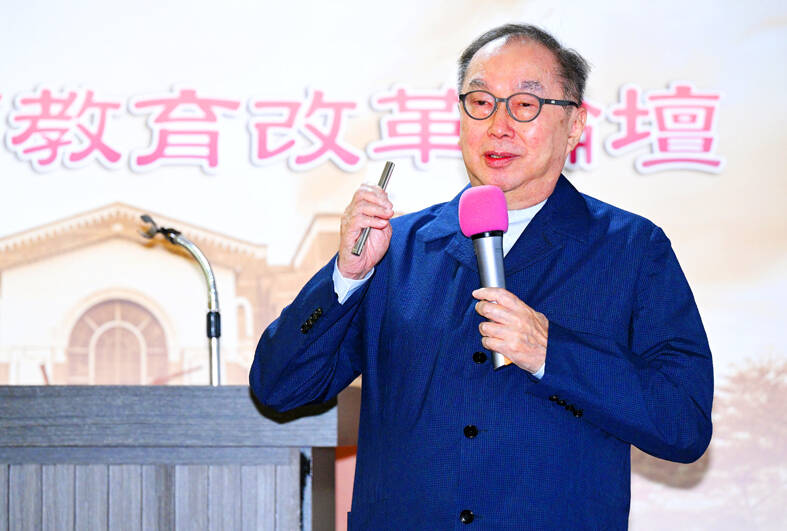Quanta Computer Inc (廣達) founder and chairman Barry Lam (林百里) has been named the richest person in Taiwan, thanks to the company’s role in the global supply chain of artificial intelligence (AI), US magazine Forbes said.
Shares of Quanta soared 37.15 percent this year to NT$293.50 on Wednesday, before the local bourse closed for the rest of the week for the Tomb Sweeping Day holiday, Taiwan Stock Exchange data showed.
Lam, 74, who steers a company that provides data centers, cloud systems and other electronics, has a net worth of US$12.6 billion and ranks 190th in the world. Quanta Computer is also a supplier to Tesla Inc and Apple Inc.

Photo: Liao Chen-hui, Taipei Times
Globally, Bernard Arnault, who oversees the LVMH Moet Hennessy Louis Vuitton SE empire of 75 fashion and cosmetics brands, retained the title of the world’s richest person, followed by Amazon.com Inc founder Jeff Bezos and Tesla Inc chief executive Elon Musk.
“The fortunes of the world’s billionaires continue to swell in 2024 as global stock markets shrug off war, political unrest and lingering inflation,” Forbes said.
They are richer than ever, worth US$14.2 trillion in aggregate, up by US$2 trillion from last year and US$1.1 trillion above the previous record set in 2021, it said.
Nvidia Corp cofounder Jensen Huang (黃仁勳) rose to become the 20th richest person as the net worth of world’s dominant supplier of AI hardware and software expanded nearly threefold last year.
Meta Platforms Inc chief executive Mark Zuckerberg ranked as the fourth-most wealthy person following a spike in the company’s net worth last year, Forbes said.
There are now more billionaires than ever, 2,781 in all, 141 more than last year and 26 more than the record also set in 2021, it said.
After Lam, footwear tycoon Zhang Cong-yuan (張聰淵), founder of shoe manufacturer Huali Industrial Group (華利實業集團), took the second spot in Taiwan and was ranked 295th in the world with a net worth of US$8.6 billion.
Hon Hai Precision Industry Co (鴻海) founder Terry Gou (郭台銘) had a net worth of US$7.5B billion, placing third in Taiwan and 354th globally, it said.
Two-thirds of the list’s members are worth more than a year earlier and only one-fourth are poorer, Forbes said.
Much of the gains come from the top 20, who added a combined US$700 billion in wealth since last year, it said.
The US now boasts a record-high of 813 billionaires worth a combined US$5.7 trillion, Forbes said, adding that China (including Hong Kong) remained second with 473 billionaires worth US$1.7 trillion, despite weak consumer spending and a real-estate bust that helped wipe out some US$300 billion in wealth.

Taiwan Semiconductor Manufacturing Co (TSMC, 台積電) would not produce its most advanced technologies in the US next year, Minister of Economic Affairs J.W. Kuo (郭智輝) said yesterday. Kuo made the comment during an appearance at the legislature, hours after the chipmaker announced that it would invest an additional US$100 billion to expand its manufacturing operations in the US. Asked by Taiwan People’s Party Legislator-at-large Chang Chi-kai (張啟楷) if TSMC would allow its most advanced technologies, the yet-to-be-released 2-nanometer and 1.6-nanometer processes, to go to the US in the near term, Kuo denied it. TSMC recently opened its first US factory, which produces 4-nanometer

GREAT SUCCESS: Republican Senator Todd Young expressed surprise at Trump’s comments and said he expects the administration to keep the program running US lawmakers who helped secure billions of dollars in subsidies for domestic semiconductor manufacturing rejected US President Donald Trump’s call to revoke the 2022 CHIPS and Science Act, signaling that any repeal effort in the US Congress would fall short. US Senate Minority Leader Chuck Schumer, who negotiated the law, on Wednesday said that Trump’s demand would fail, while a top Republican proponent, US Senator Todd Young, expressed surprise at the president’s comments and said he expects the administration to keep the program running. The CHIPS Act is “essential for America leading the world in tech, leading the world in AI [artificial

REACTIONS: While most analysts were positive about TSMC’s investment, one said the US expansion could disrupt the company’s supply-demand balance Taiwan Semiconductor Manufacturing Co’s (TSMC, 台積電) new US$100 billion investment in the US would exert a positive effect on the chipmaker’s revenue in the medium term on the back of booming artificial intelligence (AI) chip demand from US chip designers, an International Data Corp (IDC) analyst said yesterday. “This is good for TSMC in terms of business expansion, as its major clients for advanced chips are US chip designers,” IDC senior semiconductor research manager Galen Zeng (曾冠瑋) said by telephone yesterday. “Besides, those US companies all consider supply chain resilience a business imperative,” Zeng said. That meant local supply would

BIG INVESTMENT: Hon Hai is building the world’s largest assembly plant for servers based on Nvidia Corp’s state-of-the-art AI chips, Jalisco Governor Pablo Lemus said The construction of Hon Hai Precision Industry Co’s (鴻海精密) massive artificial intelligence (AI) server plant near Guadalajara, Mexico, would be completed in a year despite the threat of new tariffs from US President Donald Trump, Jalisco Governor Pablo Lemus said. Hon Hai, also known as Foxconn Technology Group (富士康科技集團), is investing about US$900 million in what would become the world’s largest assembly plant for servers based on Nvidia Corp’s state-of-the-art GB200 AI chips, Lemus said. The project consists of two phases: the expansion of an existing Hon Hai facility in the municipality of El Salto, and the construction of a